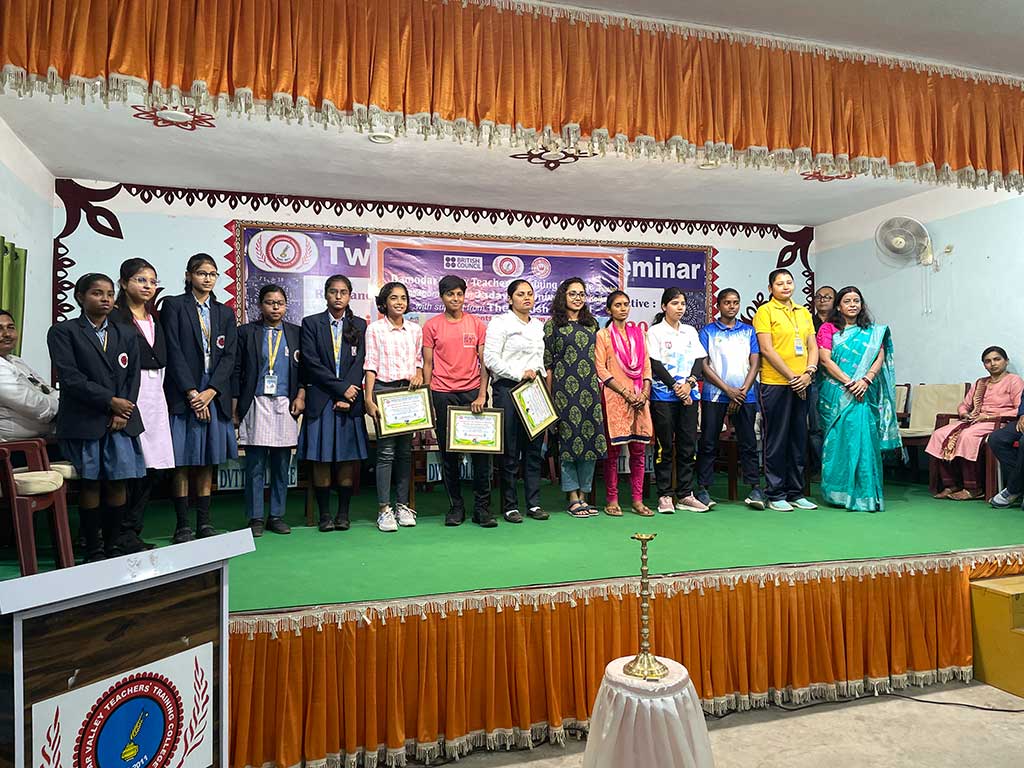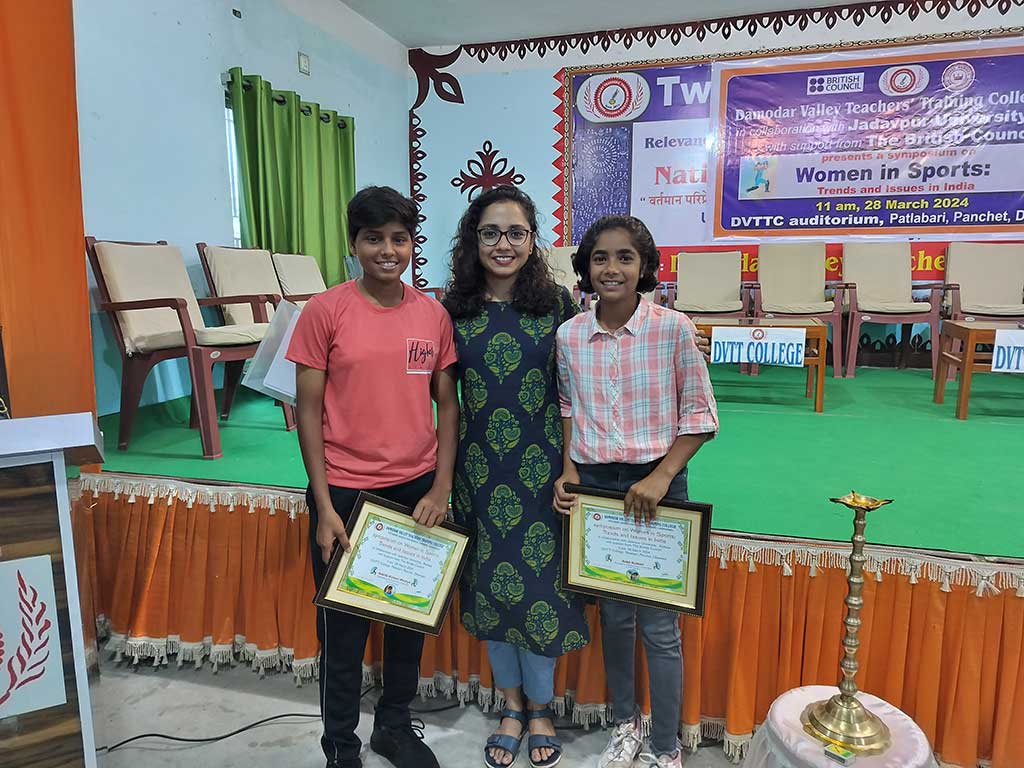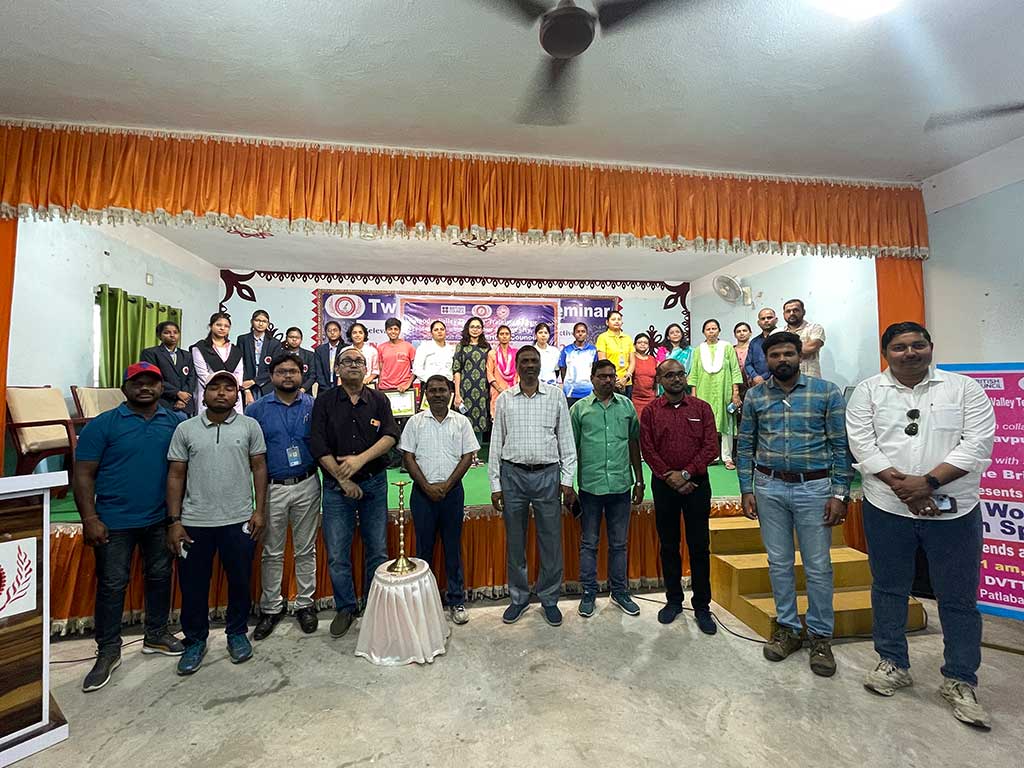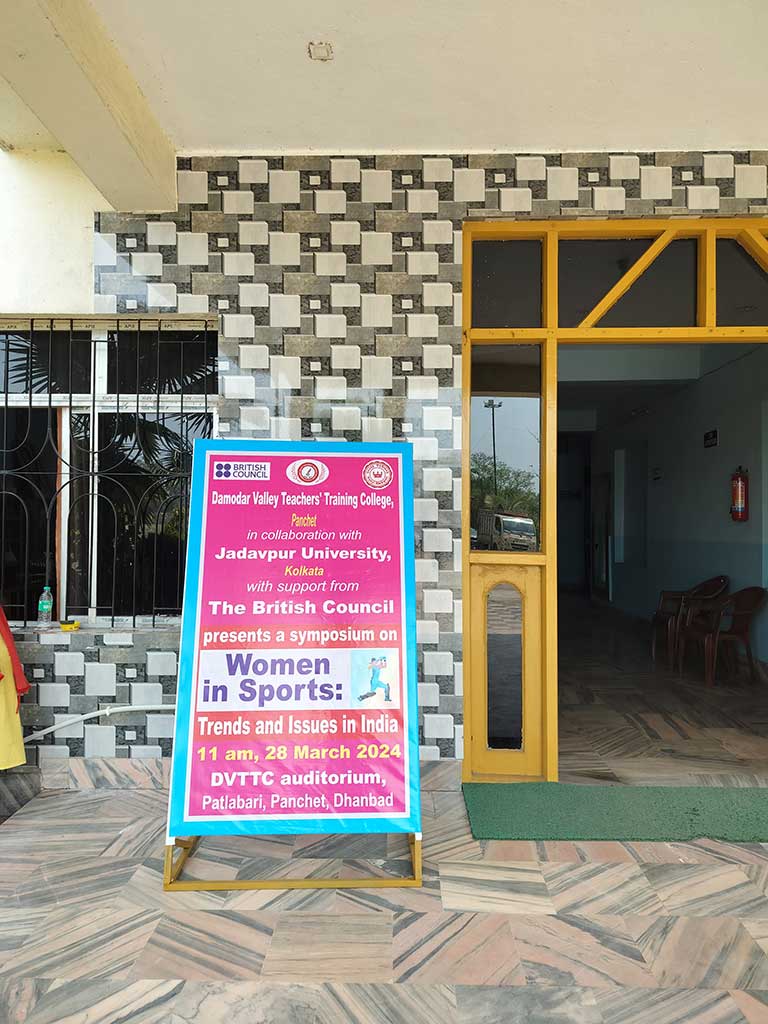Panchet (India)
A symposium titled “Women in Sports: Trends and Issues in India” was held on Thursday, 28th March 2024, at Damodar Valley Teachers’ Training College (DVTTC) auditorium, Panchet (Jharkhand) organised by DVTTC in collaboration with the ‘Her Game, Her Story’ (HGHS) project. Some renowned women sports achievers of Jharkhand, local coaches and sports administrators, teachers and students of DVTTC and Valley Public School of Panchet joined the symposium. The proceedings were mostly in Hindi and Bengali. Professor Abhijit Roy began by elaborating on the objectives of the project and the major issues in women’s sports, like the financial and social discrimination that women players face. He highlighted the importance of media visibility of women’s sports and also explained that this project aims to create a media training programme, which would highlight the different social, political and legal issues in women’s sports and equip the students with the skills of gender-sensitive coverage of sports.
This was followed by short introductions by the speakers. Among the participants were Mrs.Anita Das (national level sprinter), Ms.Varsha Chakravorty (national level archer), Ms.Arti Kumari (national level archer), Mrs. Rinku Mondal (sports teacher, Valley Public School), Ms.Dyuti Ghosh (Project Assistant of the HGHS project and West Bengal state level rifle shooter), Mrs.Swet Prabha Jha (sports teacher, national level badminton player and referee), Ms.Madhumita Hembram, Ms.Diksha Roy, Ms.Shreya Shaw and Ms. Suman Kumari (all students of Valley Public School), Ms. Astha Mishra (student of DVTTC), Mr. Abhijit Ghosh (life member, Jharkhand State Cricket Association and President of ‘Mahi Cricket Club’, the only women’s cricket club in Dhanbad), Ankita Kumari (national level cricket player) and Babli Kumari (under 19 national level cricket player).
Mrs. Anita Das, a long-distance athlete who has participated in several national games, said that she started her career from school games. However, her actual training started after her marriage, with her first participation in an event in Kolkata, where she stood fourth. Now she participates in 400 metres in the national games. She remarked she did not receive much government support despite the allotment of sports funds in each state. As her financial condition is not very good, it becomes difficult for her to manage the training costs. She also said that she has to travel a long distance to reach her training camp. She highly speaks of her husband who is quite supportive of her career. Varsha Chakravorty, who has represented Jharkhand in the national archery competition twice, said she initially wanted to do rifle shooting but the shooting range was far away from her home. So she opted for archery which her uncle recommended. Ms.Chakravorty said she got doubtful about continuing her sporting career during the COVID which badly affected her practice. But she kept herself motivated and her determination led her to the nationals in 2023. Ms.Arti Kumari, another national-level archer, said she started in 2019 in her village, where her talent was spotted by her school teacher. With proper coaching and her parents’ support, she eventually secured 3 gold medals in 2022. In 2023 she got a bronze medal in the nationals. She said initially her parents had to face a lot of criticism from the villagers about her sporting activities, but that did not stop them from supporting and encouraging her. With her consistent success, she is now celebrated in her village and the villagers now take pride in her achievements. Arti dreams of achieving more in the professional circuit of archery.
Mrs. Rinku Mondal, sports teacher of Valley Public School, said that her initial love for sports came from playing Kabaddi. Not having a female sports teacher in the school where she studied was a matter of major inconvenience for her. She feels every school should have a woman sports teacher. Dyuti Ghosh, a state-level rifle shooter and the research assistant with the project HGHS, said her initial inspiration came from her father who was a good football player. Dyuti started as a sprinter in her school and also played badminton. It was during the Covid period that she felt the need to play some sport professionally and she took up rifle shooting. In 2023 she won a silver medal as part of her team at a state-level shooting championship in West Bengal. An M.Phil in Philosophy, Dyuti spoke of how support and encouragement from others could help women reach heights of excellence both in studies and in sports. Mrs. Swet Prabha Jha, a national-level badminton player and a badminton referee, said how in her early years of training she faced criticism from her neighbours due to her late-night practice schedules. She was the only woman player to represent her district. She could not get a proper coach as it was not then a very popular sport in her area. But she trained hard to go up to the national level. After obtaining her degree of Bachelor of Education she decided to remain associated with sports as a sports teacher in a school and a badminton referee. A sportsperson certified by the National Institute of Sports, Swet Prabha feels the scenario has changed a lot since she started playing. Now society is much more supportive and women pursuing career in sports do not face much taboo. She urges all to encourage women in sports to help create a better society. She commended that Jharkhand Government has made it mandatory for all schools to have a female sports teacher. Ankita Kumari, a national-level cricket player, said her coaches have supported her in her journey. She practices in Mahi Cricket Club which is the only women’s cricket club in her area. Ankita draws her inspiration from her senior players and wishes to achieve great heights. Babli Kumari, another national-level cricket player, said initially she started bowling in order to help her uncle with his practice. Her uncle eventually realized that Babli could do well in cricket if supported by proper coaching. Now an under-19 medium fast bowler for the Jharkhand state, Babli dreams of representing India in women’s cricket.
The students of Valley Public School made short presentations on how sporting activities keep them fit, healthy, attentive in studies and confident in whatever they do. They also spoke of the contribution of women sportspersons in nation building. Mr. Abhijit Ghosh, president of Mahi Cricket Club, drew attention to certain issues concerning women’s sports: Lack of funding at the grass-root level; problems posed by family, the neighbourhood and the society at large, especially in rural areas and small towns; male dominance in sports and sports administration; sexual harassment. He emphasized the importance of following in sports clubs the Vishaka guidelines established by the Supreme Court of India to prevent sexual harassment in the workplace. He detailed how the Mahi Cricket Club promotes the values of “Beti Bachao, Beti Padhao, Beti Khelao” (Let the woman study, play and live) to create a comfortable atmosphere for the women players.
The teachers of DVTTC requested the woman students of the college and the girls in the largely tribal area around Panchet, Patlabari, Chirkunda, Kumardubi and Dhanbad to participate more in sports. They stressed on how sporting activities help a woman come out of all the taboos about one’s own body and be more confident in social interactions. Ms. Astha Mishra, a student of DVTTC, drew attention to how the idea of ‘woman as the weaker sex’ is constructed within the familial space and how that is reflected in the popular perception about women’s sports in a patriarchal society. Mr. Basudeb Mahato, the Chief Patron of DVTTC, spoke of the importance of sustenance of sporting infrastructure by private entrepreneurs in our times through financial stakeholding by the users and how such little subscriptions could create a framework of participatory management. He announced his organization would soon develop an archery range in the locality. Professor Abhijit Roy concluded by elaborating on how such a participatory model could create the very important sense of entitlement among the women sportspersons and how sporting infrastructures can enhance participation and media visibility. Many in the audience shared their experiences in the interactive session at the end of the symposium. A number of significant issues concerning the relationship between media and sports were discussed in this session, with special reference to the need for a gender-sensitive representation of women’s sports.
GALLERY





